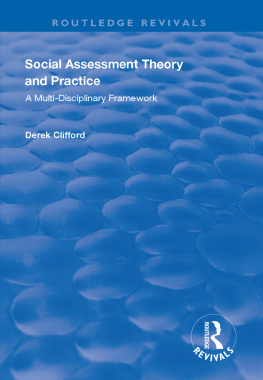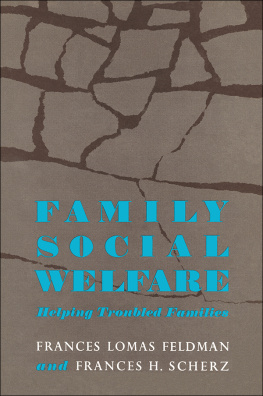Mastering Whole Family
Assessment in Social Work
Mastering Social Work Skills series
Edited by Jane Wonnacott
This series of short, accessible books focuses on the everyday key skills that social workers need in order to practise effectively and ensure the best possible outcomes for service users. Easy to read and practical, the books feature key learning points, practice examples based on real-life situations, and exercises for the reader to enhance their learning. The books in this series are essential reading for post-qualifying social work students and social work practitioners.
Jane Wonnacott is Director of In-Trac Training and Consultancy, UK.
other books in the series
Mastering Social Work Supervision
Jane Wonnacott
ISBN 978 1 84905 774 1
eISBN 978 0 85700 403 1
Mastering Approaches to Diversity in Social Work
Linda Gast and Anne Patmore
ISBN 978 1 84905 224 5
eISBN 978 0 85700 458 1
Mastering Social Work Values and Ethics
Farrukh Akhtar
ISBN 978 1 84905 274 0
eISBN 978 0 85700 594 6
of related interest
Making Sense of Child and Family Assessment
How to Interpret Childrens Needs
Duncan Helm
Foreword by Brigid Daniel
ISBN 978 1 84310 923 5
eISBN 978 0 85700 298 3
Part of the Best Practice in Working with Children series
The Childs World
The Comprehensive Guide to Assessing Children in Need
2nd edition
Edited by Jan Horwath
ISBN 978 1 84310 568 8
eISBN 978 0 85700 183 2
MASTERING
Whole Family
Assessment in
Social Work
Balancing the Needs of Children,
Adults and Their Families
Fiona Mainstone
Foreword by Jane Wonnacott
Jessica Kingsley Publishers
London and Philadelphia
Figures 1.1, 1.2, 1.4, 2.6, 2.7, 3.4, 4.2, 5.2, 5.3 and 6.2 are reproduced/adapted from The Family Model Handbook Dr Adrian Falkov, 2012 with permission of Pavilion Publishing and Media Ltd.
First published in 2014
by Jessica Kingsley Publishers
73 Collier Street
London N1 9BE, UK
and
400 Market Street, Suite 400
Philadelphia, PA 19106, USA
www.jkp.com
Copyright Fiona Mainstone 2014
Foreword copyright Jane Wonnacott 2014
All rights reserved. No part of this publication may be reproduced in any material form (including photocopying or storing it in any medium by electronic means and whether or not transiently or incidentally to some other use of this publication) without the written permission of the copyright owner except in accordance with the provisions of the Copyright, Designs and Patents Act 1988 or under the terms of a licence issued by the Copyright Licensing Agency Ltd, Saffron House, 610 Kirby Street, London EC1N 8TS. Applications for the copyright owners written permission to reproduce any part of this publication should be addressed to the publisher.
Warning: The doing of an unauthorised act in relation to a copyright work may result in both a civil claim for damages and criminal prosecution.
Library of Congress Cataloging in Publication Data
Mainstone, Fiona.
Mastering whole family assessment in social work : balancing the needs of children, adults and their
families / Fiona Mainstone ; foreword by Jane Wonnacott.
pages cm
Includes bibliographical references and index.
ISBN 978-1-84905-240-5
1. Family social work--Great Britain. 2. Family services--Great Britain. 3. Families--Great Britain. 4.
Dysfunctional families--Great Britain. 5. Family violence--Great Britain. I. Title.
HV700.G7.M25 2014
362.82640941--dc23
2013043197
British Library Cataloguing in Publication Data
A CIP catalogue record for this book is available from the British Library
ISBN 978 1 84905 240 5
eISBN 978 0 85700 484 0
CONTENTS
APPENDIX 1
ACRONYMS AND ABBREVIATIONS USED IN WHOLE FAMILY ASSESSMENT
APPENDIX 2
CLINICAL TOOLS AND MEASURES MOST FREQUENTLY USED TO INFORM ASSESSMENT IN ADULT AND CHILDRENS SERVICES
APPENDIX 3
SOME PRACTICAL TOOLS AND RESOURCES FOR WORK WITH CHILDREN AND PARENTS
Foreword
When social workers have confidence in their own skills, purpose and identity, and in the system in place to back them up, they have a huge amount to offer. They collaborate effectively with other professionals and adapt to new roles and expectations. Most importantly, they forge constructive partnerships with people who find themselves vulnerable or at risk and make a sustained difference in their lives.
Report of the Social Work Task Force (2009, p.5)
This book is an important addition to this series. It tackles one of the thorny issues of contemporary social work: how can we work together as a social work profession in order to meet the needs of the whole family?
When social workers worked generically with mixed caseloads of children and adults there was a concern that practice skills were diluted and the specialist skills needed in specific areas of practice were lost. Since the separation of adults and childrens services, social workers have been faced with the challenge of how to develop specialist social work skills with either adults or children and at the same time be able to keep the needs of the whole family in mind. Social workers sometimes report feeling de-skilled in areas of work with which they lack familiarity. Where both children and adults have apparently competing needs and social workers are working with colleagues from other services, changes to legislation, guidance and practice expectations may result in misunderstandings about each others role which hinder the assessments being carried out.
This is an unusual book in that it is for social workers working with both children and adults. It addresses the criticism from too many serious case reviews that adults and childrens services failed to work effectively together and as a result the needs of vulnerable family members were not addressed. This book aims to identify the challenges facing social workers in specific roles and explore on the fundamentals of a good assessment, giving the reader ideas and workable frameworks for practice. Like other books in this series there is a focus on the importance of reflective practice and the importance of relationships, both within and across organisational boundaries.
A comment on the title
The series has been entitled Mastering Social Work as it aims to move beyond basic skills to those which may support the practitioner in more challenging circumstances. Mastering is a process of developing expertise by applying learning and knowledge to practice. It is a continuous activity. Our aim and hope is that this series will assist social workers in this task by providing ideas and frameworks to support them in their day to day work.
Jane Wonnacott
Director of In-Trac and Consultancy, UK
ACKNOWLEDGEMENTS
Many people have been extraordinarily generous!
Several different systemic assessment models are referred to throughout this book. Bronfenbrenners ecological approach, Boushels framework for assessing the protective environment, Reder and Duncans framework for risk assessment and Farnfields ecological model of parenting all help us secure well-rounded, holistic, whole family assessments. Dr Falkovs Family Model provides an integrated approach that relates specifically to supporting mentally ill parents and their children. It is especially useful in the context of whole family assessment at the interface between adult and childrens services, because it explicitly encourages critical reflection on the complex interactions between different aspects of each familys experience. The Family Model is reproduced and briefly explained in and I am grateful to Dr Falkov for allowing me to refer to it under the terms of its licence. I firmly believe that its principles support holistic design and analysis in whole family assessment where adults face a wider range of complex life difficulties. Its emphasis on examining the dynamic between different dimensions of family experience inspires several exercises in this book.






